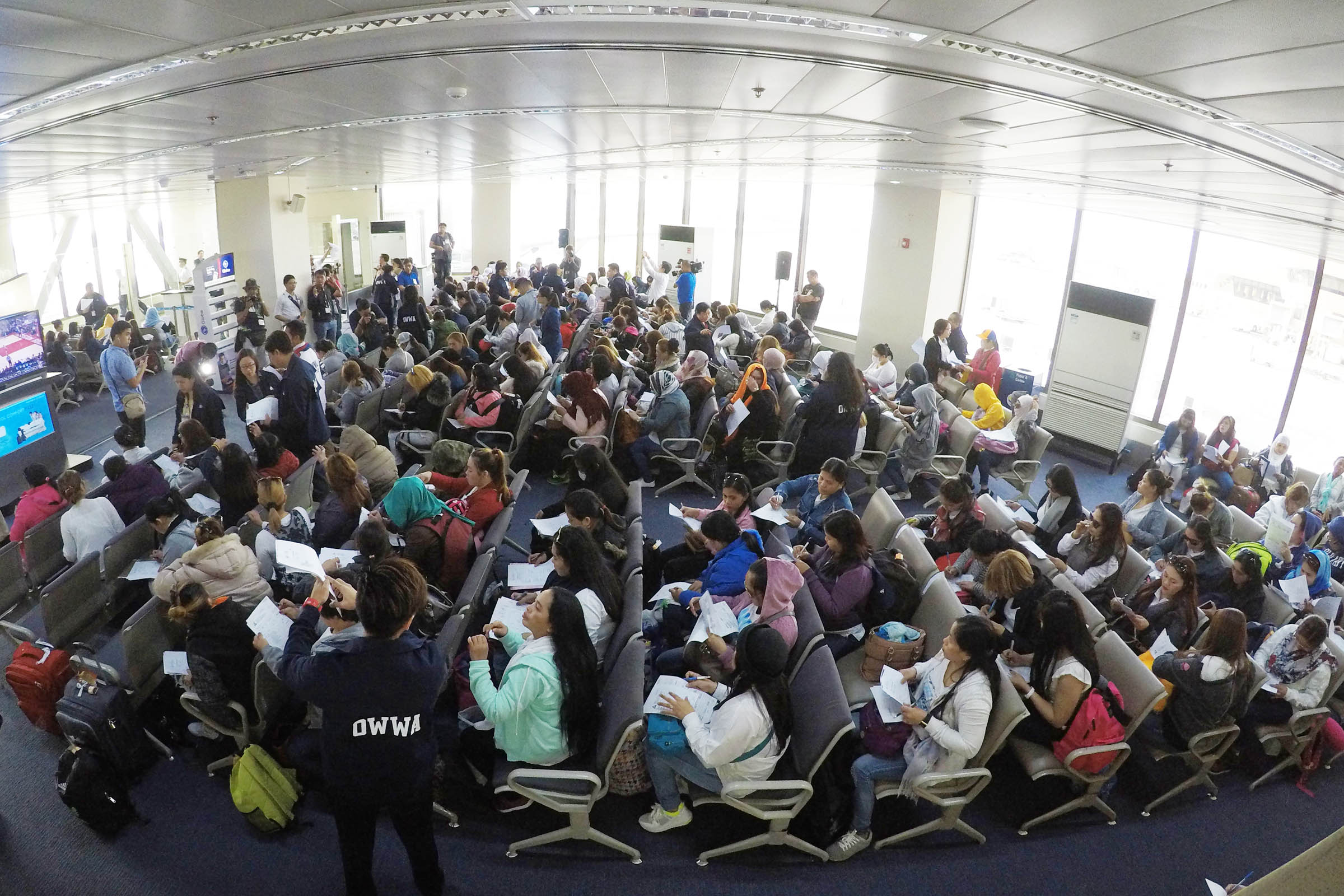Headline
POEA, OWWA to assist OFWs barred from returning to China for work

FILE: Overseas Workers Welfare Administration (OWWA) Administrator Hans Leo Cacdac and OWWA officers welcome distressed Overseas Filipino Workers (OFWs) who were repatriated from Kuwait through Philippine Airlines (PR) 669 at the Ninoy Aquino International Airport (NAIA) Terminal 1 in Pasay City on Monday morning. (Feb. 12, 2018). (PNA photo by Avito Dalan)
MANILA — The Philippine Overseas Employment Administration (POEA) and the Overseas Workers Welfare Administration (OWWA) will assist Filipinos with work permits in China and its special administrative regions affected by the temporary travel ban to prevent the spread of the novel coronavirus (2019-nCoV), the Bureau of Immigration (BI) said on Monday.
BI spokesperson Dana Sandoval made this assurance after President Rodrigo Duterte on Sunday imposed a temporary ban on Filipinos from travelling to China and its special administrative regions — Hong Kong and Macao.
Sandoval clarified that the temporary travel ban does not make any distinction for overseas Filipino workers (OFWs) who are currently home for vacation and wish to return to China, Hong Kong, or Macao for work.
Her statement is contrary to Philippine Ambassador to China Jose Santiago “Chito” L. Sta. Romana’s initial statement that Filipinos with work permits in China and its special administrative regions are not covered in the temporary travel ban.
“Lahat po ng (All) Filipino nationals who are in the country will not be allowed to depart for Hong Kong, China, and Macao,” Sandoval said in a Laging Handa press briefing in Malacañang.
“Wala pong (There is no) distinction between visa types dun sa lumabas na direktiba doon sa (in the directive on the) travel ban,” she added.
Sandoval acknowledged that OFWs who wanted to return to China, Hong Kong, or Macao were concerned about their absences from work.
However, she assured that the two attached agencies of the Department of Labor and Employment (DOLE) will put in place measures to ensure that they get to keep their jobs.
“We fully understand because kung yun ang talagang kinabubuhay nila (if it’s really their main source of income) but I believe the POEA and the OWAA will be doing their part in ensuring na itong mga trabaho ng ating mga kababayan abroad ay mananatili (that our citizens will still get to keep their jobs) despite this travel ban,” Sandoval said.
“Given the situation, I’m sure everyone understands that each country has been conducting their own restrictions when it comes to travel. We are doing this for the protection of everybody,” she added.
On the other hand, Sandoval said Filipinos with a dual citizenship status may be allowed to leave the country upon presentation of their foreign passports.
Asked if Duterte’s temporary travel ban could be extended to other countries besides China, Hong Kong, and Macao, Sandoval said it will depend on recommendations by the Department of Health (DOH) and the World Health Organization (WHO).
“If there is a need to expand it, it will be recommended by the DOH and the WHO,” Sandoval said.
Meanwhile, Sandoval also rejected criticisms that Duterte’s declaration of the travel ban was “too late.”
“We believe that it’s just right. Naka angkla po tayo (We are anchored) on the recommendations of the WHO. Ang ating (The) DOH is equipped in assessing the situation and the needs of our country. Our response is appropriate with the recommendation of the WHO,” she added.
Repatriation efforts
Currently, at least 42 Filipinos in Hubei province have expressed their interest to be repatriated amid the 2019-nCoV epidemic, Foreign Affairs Undersecretary Ernesto Abella said in the same press briefing.
Abella said the agency is expected to bring the first batch of Filipinos back home within the week.
“The aircraft may leave for China sometime this week,” Abella said.
Aside from a DFA team, medical personnel from the DOH will be deployed to pick up the Filipino repatriates from Hubei province.
All Filipino repatriates will all be required to undergo mandatory 14-day quarantine.
Meanwhile, Abella said no Filipinos in China have been confirmed to be infected with the deadly virus.
There are 295,047 Filipinos in China, he added.
Duterte is scheduled to preside over a meeting with the Inter-agency Task Force for the Management of Emerging Infectious Diseases on the government on government response amid the 2019-nCoV outbreak on Monday afternoon.
The 2019-nCoV, which originated from Wuhan in Hubei province in China, has killed at least 362 people, a vast majority in China, and infected 17,000 others, according to the World Health Organization.
The fast-spreading virus has been reported in at least 23 countries, including the Philippines.





















